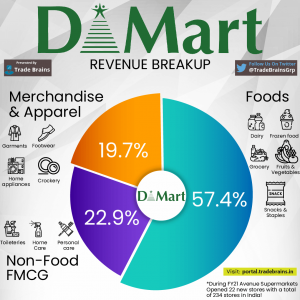


DMart, India's leading supermarket chain, saw a surge of 12.33% in its stock following a 17.18% growth in standalone revenue in the third quarter of 2021 compared to the previous year. However, concerns have been raised over increased competition in the industry, with players like Flipkart and Amazon offering home delivery at lower prices. This has led to doubts over DMart's previously unquestioned dominance in terms of price advantage. Despite this, brokerage firms like CLSA continue to suggest an 'Outperform' rating on DMart, citing its strong store addition and same store sales growth.
DMart: India's Supermarket Giant Faces Rising Competition
DMart, India's largest supermarket chain, has experienced impressive growth in recent years. However, the company now faces increased competition from e-commerce players like Flipkart and Amazon, raising concerns about its future dominance.
DMart's Recent Performance
In the third quarter of 2021, DMart reported a 17.18% growth in standalone revenue compared to the previous year. Its stock price also surged by 12.33%. Despite these positive figures, DMart has faced headwinds due to rising competition.
Competition from E-commerce
Flipkart and Amazon have been aggressively expanding their grocery delivery services in India. These companies offer home delivery at lower prices than traditional supermarkets like DMart. This has led to questions about DMart's pricing advantage, which has been a key factor in its success.
Brokerage Ratings
Despite the competition, brokerage firms like CLSA continue to maintain an 'Outperform' rating on DMart. They cite the company's strong store addition and same store sales growth as reasons for their optimism.
Background
DMart was founded in 2002 by Radhakishan Damani, a billionaire investor. The company operates over 220 stores in India and has a strong presence in major cities and towns. DMart has been known for its low prices and wide selection of products, which have attracted a loyal customer base.
Top 5 FAQs
1. What is DMart's current market share?
DMart holds a significant market share in the organized retail sector in India. However, the exact percentage varies depending on the region and product category.
2. How is DMart responding to competition from e-commerce?
DMart has launched its own e-commerce platform, DMart Ready, to counter the threat from online retailers. It is also investing in store expansion and same-store sales growth.
3. What are the key factors that will impact DMart's future performance?
The intensity of competition from e-commerce, the company's ability to maintain its pricing advantage, and the pace of store expansion will all play a crucial role in DMart's future success.
4. What is the current stock price of DMart?
As of February 25, 2023, DMart's stock price is around ₹5,200 per share.
5. What is the long-term outlook for DMart?
Analysts generally have a positive outlook for DMart. They believe that the company's strong fundamentals and expansion plans will help it weather the challenges of competition and maintain its growth trajectory.

US-based private equity firm Tillman Global Holdings (TGH) is reportedly in advanced discussions to invest up to $6 billion in Vodafone Idea Ltd, which could lead to a change in operational control. However, the investment is contingent on the Indian government providing comprehensive relief covering AGR and spectrum payment dues. If the deal goes through, it could dilute existing promoter holdings, including those held by Aditya Birla Group and Vodafone Plc. While the news has boosted investor sentiment, analysts caution that government approval and debt restructuring clarity are key to the execution of the deal.

The Indian real estate market is undergoing a major shift with rising home prices, as apartments priced between Rs 2 crore and Rs 5 crore now dominate sales. This change has been highlighted by a Redditor who expressed concerns over the dwindling chances of middle-class buyers to afford a house. According to a Moneycontrol report, the trend is a result of big developers focusing more on luxury projects, leaving affordable housing in the backseat. As a result, home ownership for the middle-class seems like a distant dream, with even government employees struggling to afford these expensive properties.

Vodafone Idea's share price saw a significant increase of 14% after the Supreme Court provided further clarity on the AGR dues issue. The court clarified that the government can consider providing relief for both additional and reassessed AGR dues, giving some respite to the struggling telecom operator. At the time of writing, Vodafone Idea's share price was trading at Rs 9.51, with a gain of 8.93%. This comes after the court's previous hearing which did not provide a clear ruling on whether the relief applies to only Vodafone Idea's plea or the entire pending AGR amount of nearly Rs 80,000 crore.

After failing to meet Apple's internal sales expectations, the ultra-thin iPhone Air is facing a significant production cut of 80%. The initial prediction of reducing production by one million units has now been deemed insufficient, highlighting deeper concerns about the device's market performance. This setback raises questions about the competitive landscape of high-end smartphones and hints at Apple's next possible move towards a foldable iPhone.

In an effort to secure their rights to their intellectual property, the Board of Control for Cricket in India (BCCI) has announced a new copyright agreement that will be in effect until 2025. This move ensures that BCCI maintains its exclusive right to reproduce, broadcast, and use any of its content, including images and videos, for commercial purposes. With the deal also covering the use of BCCI's logos and trademarks, it gives the governing body a tighter grip over its assets and sets a precedent for other sports organizations to follow suit.

The Social Security Administration recently released updates for 2026, including a potential 2.7% increase to benefits. However, the official announcement of the cost-of-living adjustment (COLA) could be delayed due to the government shutdown. While an increased COLA is positive for beneficiaries, some argue that it still may not keep up with the rising cost of living. Additionally, beneficiaries who currently receive physical paper checks will need to make arrangements for direct deposit or a Direct Express card to continue receiving their benefits.

The Indian government has given its approval for the formation of the 8th Central Pay Commission, which will be tasked with assessing and making recommendations around pay, benefits, and working conditions for over 1.2 crore central government employees and pensioners. The Commission, which will have a chairperson, a part-time member, and a member-secretary, will have 18 months to complete its work and will also look at emolument structures and conditions in the private sector and CPSUs. The recommendations are expected to be implemented from January 1, 2026.

Prime Minister Narendra Modi launched the Gyan Bharatam Portal, dedicated to preserving and promoting India’s vast and unique manuscript heritage. Speaking at the Gyan Bharatam International Conference, PM Modi emphasized the importance of preserving India’s knowledge legacy and adapting to changing times. He also highlighted how the ancient manuscripts reflect India’s diverse cultural heritage and contribute to humanity’s progress in various fields.

The Bharat International Rice Conference (BIRC) 2025, organized in New Delhi, has gathered delegates from over 80 nations, aiming to boost India's rice export share from 40% to 60%. IREF National President Prem Garg highlighted the need for increased export to benefit Indian farmers and declared the rice industry to be self-sufficient. The event, with participation from farmers, diplomats, and exporters, also emphasizes on banning pesticides and government support with ports and logistics to further boost the industry.

Prime Minister Narendra Modi's announcement, coinciding with the 150th birth anniversary of Sardar Vallabhbhai Patel, to showcase only indigenous Indian dog breeds at the upcoming National Unity Day Parade highlights the country's reliance on self-sustained K9 forces. The Ekta Diwas Samaroh celebrated India's diversity and unity, while PM Modi emphasized the significant role of indigenous dog breeds in Indian military and cultural traditions. With the current population of 150 Indian breeds deployed in strategic areas, the initiative, which gained momentum after PM Modi's visit to the BSF National Dog Training Centre in 2018, showcases the agility, stamina, and adaptability of these breeds in diverse terrains and climates.